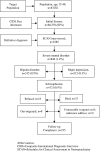Clinical course and outcome of schizophrenia in a predominantly treatment-naive cohort in rural Ethiopia
- PMID: 18448478
- PMCID: PMC2669573
- DOI: 10.1093/schbul/sbn029
Clinical course and outcome of schizophrenia in a predominantly treatment-naive cohort in rural Ethiopia
Abstract
The established view that schizophrenia may have a favorable outcome in developing countries has been recently challenged; however, systematic studies are scarce. In this report, we describe the clinical outcome of schizophrenia among a predominantly treatment-naive cohort in a rural community setting in Ethiopia. The cohort was identified in a 2-stage sampling design using key informants and measurement-based assessment. Follow-up assessments were conducted monthly for a mean duration of 3.4 years (range 1-6 years). After screening 68 378 adults, ages 15-49 years, 321 cases with schizophrenia (82.7% men and 89.6% treatment naive) were identified. During follow-up, about a third (30.8%) of cases were continuously ill while most of the remaining cohort experienced an episodic course. Only 5.7% of the cases enjoyed a near-continuous complete remission. In the final year of follow-up, over half of the cases (54%) were in psychotic episode, while 17.6% were in partial remission and 27.4% were in complete remission for at least the month preceding the follow-up assessment. Living in a household with 3 or more adults, later age of onset, and taking antipsychotic medication for at least 50% of the follow-up period predicted complete remission. Although outcome in this setting appears better than in developed countries, the very low proportion of participants in complete remission supports the recent observation that the outcome of schizophrenia in developing countries may be heterogeneous rather than uniformly favorable. Improving access to treatment may be the logical next step to improve outcome of schizophrenia in this setting.
Figures
References
-
- Dube K, Kumar N, Dube S. Longterm course and outcome of Agra cases in the International Pilot study of schizophrenia. Acta Psychiatr Scand. 1984;70:170–179. - PubMed
-
- Harrison G, Hopper K, Craig T, et al. Recovery from psychotic illness: a 15- and 25-year international follow-up study. Br J Psychiatry. 2001;178:506–517. - PubMed
-
- Jablensky A, Sartorius N, Ernberg G, et al. Schizophrenia: manifestations, incidence, and course in different cultures. A World Health Organization ten-country study. Psychol Med Monogr Suppl. 1992;20:1–97. - PubMed
-
- Sartorius N, Gulbinat W, Harrison G, Laska E, Siegel C. Long-term follow-up of schizophrenia in 16 countries. A description of the International Study of Schizophrenia conducted by the World Health Organization. Soc Psychiatry Psychiatr Epidemiol. 1996;31:249–258. - PubMed
-
- Sartorius N, Jablensky A, Shapiro L. Two-year follow-up of the patients included in the WHO International Pilot Study of Schizophrenia. Psychol Med. 1977;7:529–541. - PubMed


